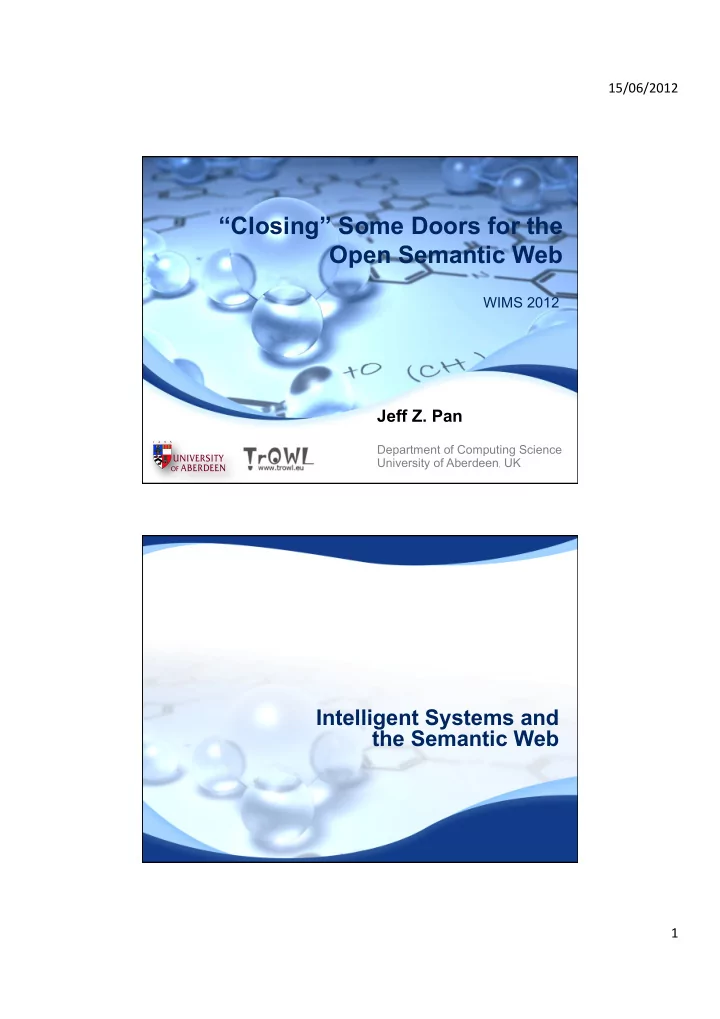

15/06/2012 ¡ “Closing” Some Doors for the Open Semantic Web WIMS 2012 Jeff Z. Pan Department of Computing Science University of Aberdeen , UK Intelligent Systems and the Semantic Web 1 ¡
15/06/2012 ¡ Smart Software vs. Smart Data John McCarthy defines Artificial Intelligence as • science and engineering of • making intelligent machines 1. Smart software : e.g. , finding insights and patterns 2. Smart data: data annotated with linkable and sharable ontological vocabulary 3 Semantics Makes Data Smarter Three key steps: 1. Map data into RDF format 2. Annotate RDF data with vocabulary defined in OWL ontologies TBox: def. of vocabulary • ABox: annotated data • 3. Merge the annontated data and query with SPARQL [Diagram credit: Ivan Herman] 4 2 ¡
15/06/2012 ¡ Linked Open Data [Photo source: talis.com] 5 Schema.org Annotating deep database data with open vocabulary Official OWL ontology: http://schema.org/docs/schemaorg.owl HTML microdata: http://www.w3.org/TR/microdata / 6 3 ¡
15/06/2012 ¡ Can We Reuse Closed Data As Open Data? 7 Open vs. Closed World Assumptions OWA (ontologies only cover key aspects of the world ) Food Note • Is Pepper Salad SpicyFood? Curry Chicken Spicy • UNKNOWN Salmon Fillet Spicy Grilled Spicy CWA ( complete information Shrimp about the world) Pepper Salad • Is Pepper Salad SpicyFood? • No, because • "SpicyFood={Curry Chicken, Spicy Grilled Shrimp}" 8 4 ¡
15/06/2012 ¡ Explicit CWA vs. Implicit CWA Is Spicy Grilled Shrimp Food Note the only SpicyFood? Curry Minor • SpicyFood={Spicy Chicken Spicy Grilled Shrimp}? • No, because of Salmon Fillet background knowledge: Spicy Grilled Spicy • "MinorSpicyFood" is Shrimp SpicyFood Pepper Vege Salad CWA should support necessary reasoning 9 Local Closed World Assumption (LCWA) In general, it uses an OWA setting • Assuming ontologies only cover key aspects of the world For certain parts, it allows CWA • Assuming one has complete knowledge about the part of the world • Implicit CWA should be allowed LCWA is more general 10 5 ¡
15/06/2012 ¡ Combining Open and Closed World Assumptions: Existing Solutions and Standards 11 SPARQL Does not close ontological vocabulary. Walk around : Realised by testing for the absence of a pattern in a graph Get all food not known to be spicy SELECT ?dish WHERE { ?dish rdf:type Food . FILTER NOT EXISTS { ?dish rdf:type SpicyFood} } Problem : curry chicken is inlcuded in the answer set (if we use SPARQL without reasoning) 6 ¡
15/06/2012 ¡ DBox [Seylan et al., 2009] Accommodate a DB component in an ontology • TBox: schema axioms • ABox: data axioms • DBox : fixes the extensions of DBox predicates Faithful encoding of database • usually with unique name assumption (UNA) • Does not allow implicit CWA 13 Epistemic Operators Used in e.g. MKNF (Minimal Knowledge and Negation as Failure) [Motik and Rosati, 2010] • The K operator: things we know • K Vege: the concept of all known Vege in the ontology • The not operator: Negation as Failure • not A is equivalent to ¬ ( K A) • Example PepperSalad: not (Spicy) meaning PepperSalad is not evidently (not known to be) Spicy MKNF increases the complexity of reasoning 14 7 ¡
15/06/2012 ¡ Negation as failure Box (NBox) [Ren et. al, 2010] 1. To allow inference w.r.t. the closed classes and properties O=(T, A, N) • N ={SpicyFood, VegeFood} is the NBox in O • 2. To provide restricted forms of the K and not operators for non-monotonic reasoning so that it does not increase the complexity of • reasoning for OWL 2 DL 15 NBox Reasoning (T, A, N) |= x: ¬ B iff (T, A) | ≠ x:B Guest some • E.g., Salmon is neither VegeFood, nor some SpicyFood ¬ B is equivalent to not B Vegetarian B is equivalent to K B order Food Using classical reasoning to retrieve instance of predicates Jeff Yuan VegeFood SpicyFood • E.g., Pepper is VegeFood Jek Using nominals to close predicates Minor Pepper • E.g., VegeFood = {Pepper Salad} Spicy Yuting Shrimp Food Adding axioms back to ontology for Salmon incremental reasoning Chicken • Yuting orders Pepper! order 16 8 ¡
15/06/2012 ¡ Challenges for NBox Reasoning Challenge 1: Ontologies with nominals are harder to reason with • Using approximate reasoning technologies [Ren et. al, 2010b] to reduce to a tractable DL • Identify safe consitions for tractable DLs, such as EL and DL-Lite [Lutz et al. 2012] Challenge 2: Incremental reasoning is usually difficult for expressive DLs • EL supports tractable incremental reasoning services! [Ren and Pan, 2011] 17 Example: Approximate Reasoning [Ren et al. 2010] Additional completion Rules (on top of the EL ones), e.g. • Handling complement • E.g. B subClassOf C => ¬ C subClassOf ¬ B • Handling cardinality • E.g. A subClassOf >= 3 r. B => A subClassOf >= 2 r. B • Soundness preserving and tractable X1 X2 ALL ALL A Some Some D A D r B C r nB nC B C 18 9 ¡
15/06/2012 ¡ TrOWL: a tractable semantic reasoning infrastructure Parallel reasoning Approximate reasoning [JIST2011] [AAAI2007, AAAI2010, AAAI2012] Stream reasoning Local closed world [CIKM2011] reasoning (NBox) [JTS] 19 Benefits of Local Closed World Assumption in NBox • Fine-grained integration of closed data and open data Connecting Semantic Intranets • (Islands) to the Semantic Web [Photo credit: http://www.tapeka.com] 20 10 ¡
15/06/2012 ¡ Take Home: Open the Doors for Data Integration We Need to Know How to Close Some Doors When Needed [Photo source: eatmyzombie.com, www.dan-dare.org] Where to find more information [For key references] Jeff Z. Pan. “Closing Some Doors for the • Open Semantic Web”. In Proceeding of 2 nd International Conference on Web Intelligence, Mining and Semantics. 2012. [For further discussions] Jeff Z. Pan. Local Closed World • Reasoning in OWL 2 . Tutorial in The First Joint International Semantic Technology Conference (JIST2011) . Hangzhou, China, 4 Dec, 2011. 11 ¡
15/06/2012 ¡ “Closing” Some Doors for the Open Semantic Web WIMS2012 Thank you … questions ? 12 ¡
Recommend
More recommend